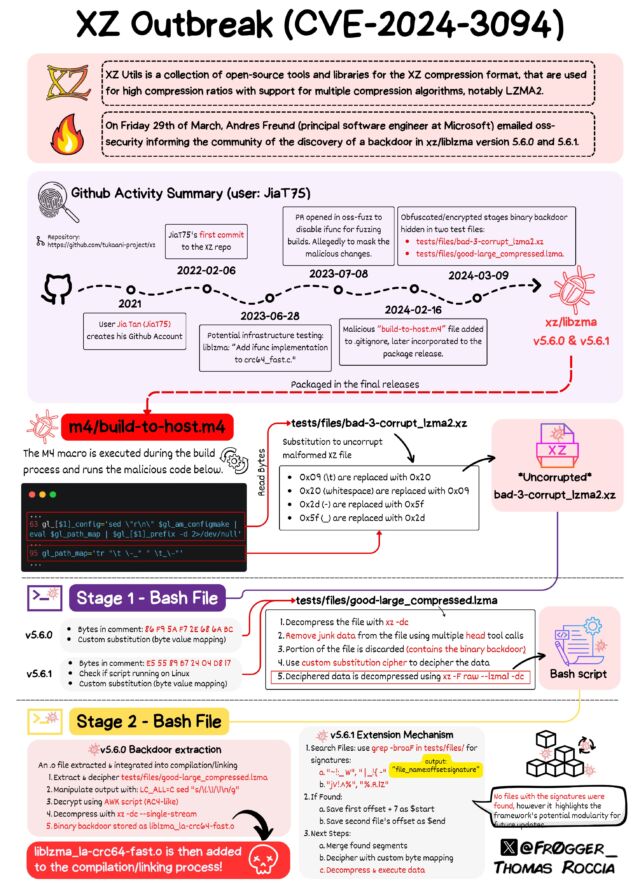On Friday, a lone Microsoft developer rocked the world when he revealed a backdoor had been intentionally planted in xz Utils, an open source data compression utility available on almost all installations of Linux and other Unix-like operating systems. The person or people behind this project likely spent years on it. They were likely very close to seeing the backdoor update merged into Debian and Red Hat, the two biggest distributions of Linux, when an eagle-eyed software developer spotted something fishy.
"This might be the best executed supply chain attack we've seen described in the open, and it's a nightmare scenario: malicious, competent, authorized upstream in a widely used library," software and cryptography engineer Filippo Valsorda said of the effort, which came frightfully close to succeeding.Researchers have spent the weekend gathering clues. Here's what we know so far.
What is xz Utils?
xz Utils is nearly ubiquitous in Linux. It provides lossless data compression on virtually all Unix-like operating systems, including Linux. xz Utils provides critical functions for compressing and decompressing data during all kinds of operations. xz Utils also supports the legacy .lzma format, making this component even more crucial.
What happened?
Andres Freund, a developer and engineer working on Microsoft’s PostgreSQL offerings, was recently troubleshooting performance problems a Debian system was experiencing with SSH, the most widely used protocol for remotely logging in to devices over the Internet. Specifically, SSH logins were consuming too many CPU cycles and were generating errors with valgrind, a utility for monitoring computer memory.
Through sheer luck and Freund’s careful eye, he eventually discovered the problems were the result of updates that had been made to xz Utils. On Friday, Freund took to the Open Source Security List to disclose the updates were the result of someone intentionally planting a backdoor in the compression software.
It's hard to overstate the complexity of the social engineering and the inner workings of the backdoor. Thomas Roccia, a researcher at Microsoft, published a graphic on Mastodon that helps visualize the sprawling extent of the nearly successful endeavor to spread a backdoor with a reach that would have dwarfed the SolarWinds event from 2020.

What does the backdoor do?
Malicious code added to xz Utils versions 5.6.0 and 5.6.1 modified the way the software functions. The backdoor manipulated sshd, the executable file used to make remote SSH connections. Anyone in possession of a predetermined encryption key could stash any code of their choice in an SSH login certificate, upload it, and execute it on the backdoored device. No one has actually seen code uploaded, so it's not known what code the attacker planned to run. In theory, the code could allow for just about anything, including stealing encryption keys or installing malware.
Wait, how can a compression utility manipulate a process as security sensitive as SSH?
Any library can tamper with the inner workings of any executable it is linked against. Often, the developer of the executable will establish a link to a library that's needed for it to work properly. OpenSSH, the most popular sshd implementation, doesn’t link the liblzma library, but Debian and many other Linux distributions add a patch to link sshd to systemd, a program that loads a variety of services during the system bootup. Systemd, in turn, links to liblzma, and this allows xz Utils to exert control over sshd.
How did this backdoor come to be?
It would appear that this backdoor was years in the making. In 2021, someone with the username JiaT75 made their first known commit to an open source project. In retrospect, the change to the libarchive project is suspicious, because it replaced the safe_fprint funcion with a variant that has long been recognized as less secure. No one noticed at the time.
The following year, JiaT75 submitted a patch over the xz Utils mailing list, and, almost immediately, a never-before-seen participant named Jigar Kumar joined the discussion and argued that Lasse Collin, the longtime maintainer of xz Utils, hadn’t been updating the software often or fast enough. Kumar, with the support of Dennis Ens and several other people who had never had a presence on the list, pressured Collin to bring on an additional developer to maintain the project.
In January 2023, JiaT75 made their first commit to xz Utils. In the months following, JiaT75, who used the name Jia Tan, became increasingly involved in xz Utils affairs. For instance, Tan replaced Collins' contact information with their own on oss-fuzz, a project that scans open source software for vulnerabilities that can be exploited. Tan also requested that oss-fuzz disable the ifunc function during testing, a change that prevented it from detecting the malicious changes Tan would soon make to xz Utils.
In February of this year, Tan issued commits for versions 5.6.0 and 5.6.1 of xz Utils. The updates implemented the backdoor. In the following weeks, Tan or others appealed to developers of Ubuntu, Red Hat, and Debian to merge the updates into their OSes. Eventually, one of the two updates made its way into the following releases, according to security firm Tenable:
| Distribution | Advisory | Notes |
|---|---|---|
| Fedora Rawhide | https://www.redhat.com/en/blog/urgent-security-alert-fedora-41-and-rawhide-users | Fedora Rawhide is the development distribution of Fedora Linux |
| Fedora 41 | https://www.redhat.com/en/blog/urgent-security-alert-fedora-41-and-rawhide-users | |
| Debian testing, unstable and experimental distributions versions 5.5.1alpha-0.1 to 5.6.1-1. | https://lists.debian.org/debian-security-announce/2024/msg00057.html | |
| openSUSE Tumbleweed and openSUSE MicroOS | https://news.opensuse.org/2024/03/29/xz-backdoor/ | Backdoored version of xz was included in Tumbleweed and MicroOS between March 7 and March 28 |
| Kali Linux | https://www.kali.org/blog/about-the-xz-backdoor/ | Backdoored version of xz was included in Kali Linux (xz-utils 5.6.0-0.2) between March 26 and March 28 |
There’s more about Tan and the timeline here.































